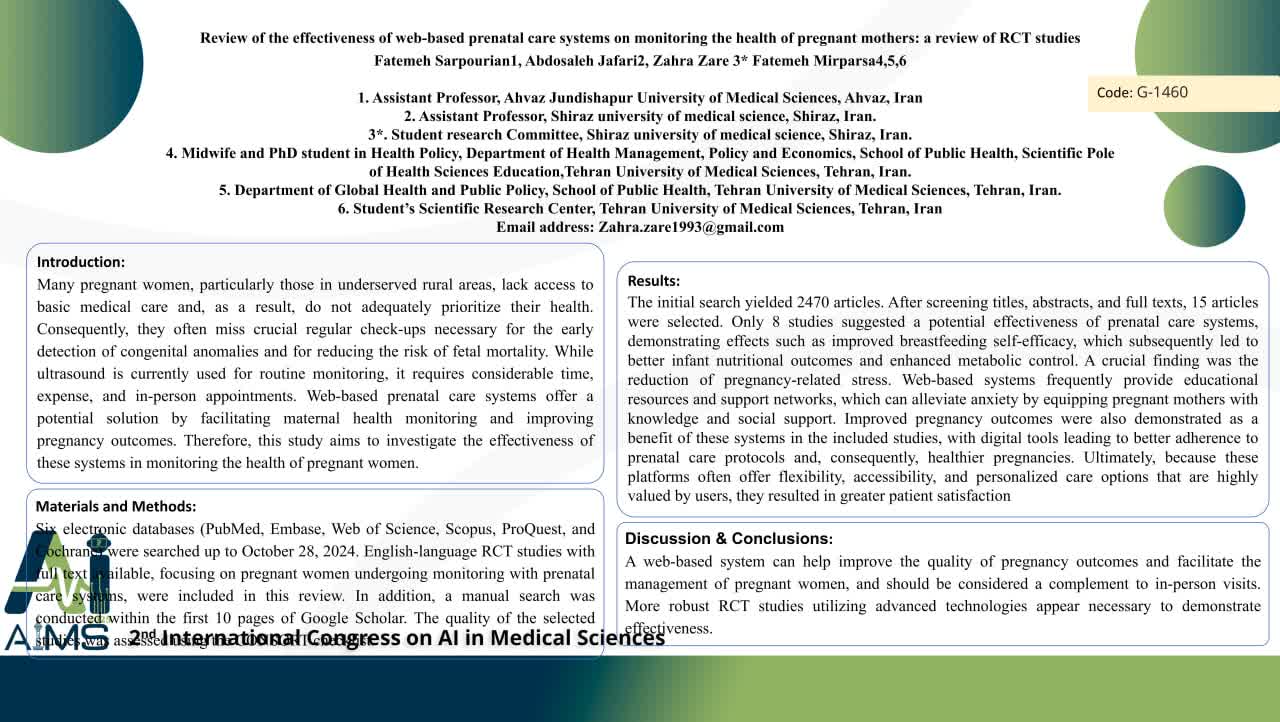بررسی اثربخشی سامانه های مراقبت قبل از تولد مبتنی بر وب بر پایش سلامت مادران باردار: مروری بر مطالعات RCT
کد: G-1460
نویسندگان: Fatemeh Sarpourian ℗, Abdosaleh Jafari, Zahra Zare *, Shokrollah Mohseni, Fatemeh Mirparsa
زمان بندی: زمان بندی نشده!
برچسب: رباتیک در جراحی و مراقبت سلامت
دانلود: دانلود پوستر
خلاصه مقاله:
خلاصه مقاله
Background and aims: Many pregnant women, particularly those in underserved rural areas, lack access to basic medical care and, as a result, do not adequately prioritize their health. Consequently, they often miss crucial regular check-ups necessary for the early detection of congenital anomalies and for reducing the risk of fetal mortality. While ultrasound is currently used for routine monitoring, it requires considerable time, expense, and in-person appointments. Web-based prenatal care systems offer a potential solution by facilitating maternal health monitoring and improving pregnancy outcomes. Therefore, this study aims to investigate the effectiveness of these systems in monitoring the health of pregnant women. Method: Six electronic databases (PubMed, Embase, Web of Science, Scopus, ProQuest, and Cochrane) were searched up to October 28, 2024. English-language RCT studies with full text available, focusing on pregnant women undergoing monitoring with prenatal care systems, were included in this review. In addition, a manual search was conducted within the first 10 pages of Google Scholar. The quality of the selected studies was assessed using the CONSORT checklist. Results: The initial search yielded 2470 articles. After screening titles, abstracts, and full texts, 15 articles were selected. Only 8 studies suggested a potential effectiveness of prenatal care systems, demonstrating effects such as improved breastfeeding self-efficacy, which subsequently led to better infant nutritional outcomes and enhanced metabolic control. A crucial finding was the reduction of pregnancy-related stress. Web-based systems frequently provide educational resources and support networks, which can alleviate anxiety by equipping pregnant mothers with knowledge and social support. Improved pregnancy outcomes were also demonstrated as a benefit of these systems in the included studies, with digital tools leading to better adherence to prenatal care protocols and, consequently, healthier pregnancies. Ultimately, because these platforms often offer flexibility, accessibility, and personalized care options that are highly valued by users, they resulted in greater patient satisfaction. Conclusion: A web-based system can help improve the quality of pregnancy outcomes and facilitate the management of pregnant women, and should be considered a complement to in-person visits. More robust RCT studies utilizing advanced technologies appear necessary to demonstrate effectiveness.
کلمات کلیدی
Pregnancy, Web-Based Prenatal Care Systems
